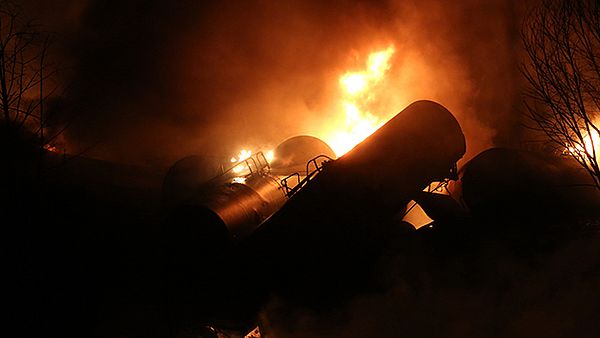Two more fiery train derailments this month highlight the vulnerability of people, wildlife and waterways from the dramatic increase of crude oil transport by rail. The latest debacle has added pressure to improve rail transportation of flammable liquids. On February 15, 29 cars from a one-hundred car Canadian National train left the tracks in remote Northern Ontario. At least seven cars caught fire according to the Toronto Globe and Mail. A day later near Mount Carbon, West Virginia, a CSX train with 109 cars derailed. Twelve to 15 cars left the tracks and at least seven burst into flames. The incident led to evacuations of two small towns and threatened the drinking water source for several communities.
Both of these derailments involved rail cars known as CPC-123s. While these cars are an improvement over older DOT-111s they are not immune to puncture and explosion. These cars have now failed at least four times during accidents. The U.S. Department of Transportation (DOT) has developed a suite of new rules for tanker truck construction, but it will be at least October before production of the new cars begins, and may take several years before they are in wide use.
The DOT proposed mandatory rules to toughen safety standards for railroads back in July. Congress charged the Department of Transportation with finalizing those rules by January 15, but DOT missed that deadline, and doesn’t anticipate issuing the rule until May.
The Associated Press recently reported on a DOT prediction of an average of 10 derailments per year of rail cars carrying flammable materials. Derailments will cause more than $4 billion in damages. However, if even one of the derailments occurs in a high population area it could kill more than 200 people and cause roughly $6 billion in damage.
Meanwhile, NBC News reports that railroads have proposed cutting their train crews from two people to one. Trains currently are run by an on-board conductor and an engineer, but the railroads would like to eliminate the conductor position. Representatives of the railways' union have called the proposal a recipe for disaster, and fear it will lead to more train accidents.
In Albany, the New York Department of Environmental Conservation (NY DEC) review of a proposed Global Partners oil heating facility continues. NY DEC was close to approving the facility last year but public outcry led them to extend the comment and review period. That comment period ended on November 30 of last year. DEC has not announced when the review will now be completed. LCC and the Adirondack Mountain Club filed joint comments on the proposal calling for a full environmental impact review that includes analysis of impacts of oil transport via rail throughout the region including along Lake Champlain.
